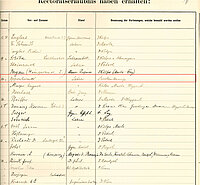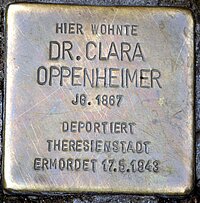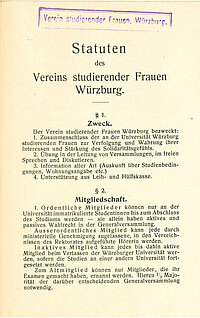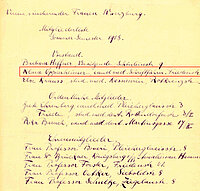Klara Oppenheimer
* 06.11.1867 in Paris † 17.05.1943 at the Concentration Camp in Theresienstadt
1886 Teacher training at the “Aschaffenburger Lehrerseminar”
1889 Teaching Exam
1905 A-Level (Abitur) at the “königliches Realgymnasium” in Würzburg
1906 Study of medicine in Würzburg
1910 Medical Exam
1912 Conferral of a doctorate and employment as a medical assistant in Würzburg, later Düsseldorf
1917 Return to Würzburg as a doctor at the paediatric clinic
1918 Opening of a doctor’s office for infant’s and children’s disease
1933 Closure of the office for health reasons
1942 Deportation
On the occasion of her 150th birthday, the University Archives of the Julius-Maximilians-University Würzburg want to use its “Scholar of the Month”-Series to honour their former student Klara Oppenheimer in November 2017. Technically, she cannot be considered as a significant academic (bedeutende Gelehrte) of the University, as she never taught or did research at the Alma Julia. Instead she can rather be regarded as character with an outstanding social commitment and incredible ability to assert herself, as she was an early driving force of the feminism in Würzburg.
High-Flyer
Klara Oppenheimer was the daughter of wealthy parents of German and Jewish origin. Her father, who was a rich investor, came to Würzburg and purchased multiple properties, which he later gave to his daughter. At first, it seemed like Klara’s life proceeded as planned. With passing the teachers exam in Aschaffenburg, she obtained the highest possible qualification a woman could get at this time. But her academic career hasn’t come to an end yet. From 1900 on, she can regularly be found as a guest auditor on the registers of the Julius-Maximilians-University. After acquiring her A-Level (Abitur) at the age of 38, she started to study medicine - which was just recently being permitted for women - and finished it with a conferral to a doctorate and her licensure approval.
Commitment to women's rights
The dedication of Klara Oppenheimer was not just limited to her own academic progress. In 1898, she was one of the founders of an association called “Frauenheil” which had the goal to support the higher education and the working capacities for women, that depend on their very own support, through training in cooking, housekeeping and ironing. The truth is, these training courses weren’t limited to the last-mentioned activities, as the request of the medical professor Lehmann shows, who asked for permission at the University-management to conduct a course at the “Frauenheil”-association. Moreover, they founded a legal advice service for women, who wanted to start an academic career. In 1918, Oppenheimer also opened her personal doctor’s office, which makes her the first settled, female doctor in Würzburg.
Discrimination and National Socialism
As Oppenheimer was a Jewish woman of the 20th century, that remained unmarried and followed an academic career, political and social tension didn’t hold of. Already as a student, she tried to initiate a disciplinary enquiry against other students at the clinic, who publically shamed her age and origin. It was even worse during the National Socialism: A huge amount of her assets were confiscated by the regime for “safety reasons”, she was being limited in her access to the rest of her money, and even her house was being turned into a “Judenhaus” by the Nazis. Meanwhile, Klara Oppenheimer arranged an illegal doctor’s office for Jewish patients, that were denied medical treatment by Arian doctors, which was shut down by the Gestapo in 1940. On the 23.09.1942 - at the age of 74 - she was deported to the Concentration Camp in Theresienstadt and later died there on the 17.05.1943.


Recommended Readings:
Dettelbacher, Werner: Dr. Klara Oppenheimer – die erste niedergelassene Kinderärztin Würzburg, in: Würzburger medizinhistorische Mitteilungen, Bd. 21 (2002), S. 43-48.
Hessenauer, Heike: Etappen des Frauenstudiums an der Universität Würzburg (1869-1939), Neustadt a. d. Aisch 1998.




